
The greatest motivation you can offer is something new and challenging to complete. So give your team members jobs that are just beyond their comfort zone, and they'll enjoy a sense of accomplishment when they complete the difficult new task.

The greatest motivation you can offer is something new and challenging to complete. So give your team members jobs that are just beyond their comfort zone, and they'll enjoy a sense of accomplishment when they complete the difficult new task.

Increased educational costs have new graduates struggling with more debt than ever before. Yet most feel confident they can carry the weight.
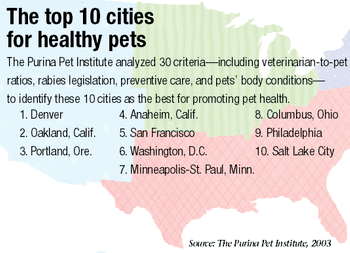
Where you choose to live affects your career opportunities, your personal happiness, and even the health of the patients you see. Does your city rank among the best?
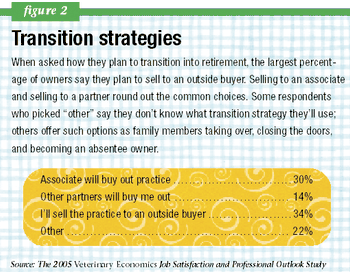
Step one: Weigh the benefits and decide whether you're interested in ownership. Step two: Start developing critical leadership skills.
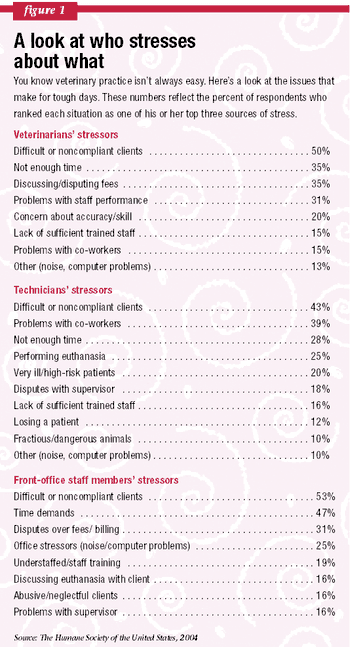
Nearly 30 percent of practitioners are at risk for compassion fatigue. Would you recognize the symptoms and know what to do?

During a continuing education meeting held by local orthopedic specialists, Dr. Mike McLaughlin, owner of Animal Medical Center of Cumming, in Cumming, Ga., was intrigued about a surgical procedure called TPO, or triple pelvic osteotomy. He heard the specialists say that some large-breed dogs with hip dysplasia can enjoy an improved quality of life, or at least a slowed disease progression, by undergoing TPO.

Enjoy a happy veterinary career by leaving your angst at the door.

Think you're working too much? Odds are you're not delegating enough to team members-who are hungry to help.
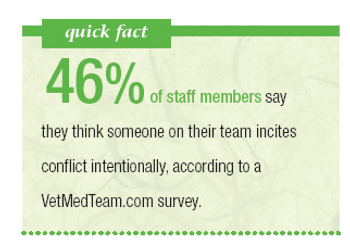
Use these strategies to address discord before interpersonal issues undermine your business-and your passion for practice.

Using a laparoscopic technique to perform ovariohysterectomy, cryptorchidectomy, and exploratory laparotomy with abdominal biopsy, and using thoracoscopy to perform thoracic exploratory means less pain and quicker recovery time for patients. And for Dr. Rex Bailey, owner of Michigan City Animal Hospital in Michigan City, Ind., laparoscopic services mean better pet care, happier clients, more rewarding work for himself, and good news for his business.

I'd wanted to be a veterinarian since I was 7 years old, but after 12 years in practice, I didn't know if I could stand another day. I was frustrated, tired, and worn out by the constant stresses of practice, including staffing headaches, client turnover, and financial strains. And those stresses were having a profoundly negative influence on my personal life, too.

Confrontation in the workplace can be tricky—you don't want to burn bridges, but you also don't want to suffer at the hands of a colleague.

Commit to these 10 culture changes to build a terrific practice.

In prior articles, I gave advice on creating and writing a strong, compelling vision for your life and work. But crafting the vision is just the first step. Next you must figure out how to make your vision a reality.

Work better with goal planning.

Different people find different situations stressful, but some stressors transcend personal differences and affect a majority. Many such key job stresses are associated with these six categories:
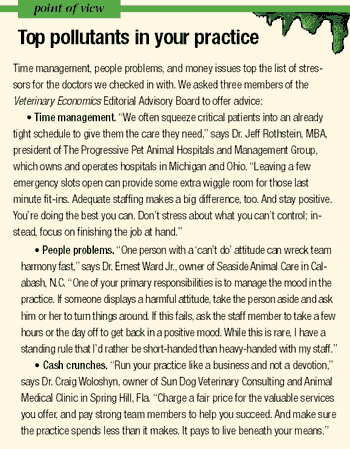
Use these strategies to make sure tension never becomes toxic for you or your team.

You and your staff members likely make tough ethical decisions every day. Yet only 43 percent of respondents to a recent survey by VetMedTeam.com, an online resource and team training center, say their practice teams discuss ethics.
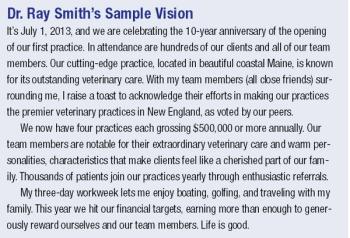
Last month, we discussed the power of crafting a compelling practice vision. The next step: putting your vision in writing. As you're writing, see your vision as an already-accomplished reality, not merely as something you hope will happen. Write in the first person and present tense, creating a vivid mental image with as much detail as possible to bring your vision to life. Use all your senses—sight, hearing, touch, smell, and taste—to develop your description.

It's difficult to really know what a job offers until you've been there a while (Catch-22!), but a little astute questioning can help. Use these questions as aids. Don't read them to prospective employers as a list of demands—gently work them into interviews when appropriate.

As different as associates' experiences are, they generally enter practice with four concerns. Dr. Philip VanVranken, the managing partner at Dickman Road Veterinary Clinic, a seven-doctor practice in Battle Creek, Mich., offers his insight from 30 years of experience and provides some quick mentoring. Here are his answers to four common questions.

Buying into a practice could bring great opportunities or heartache. The key: Know what you're getting into.

I know that an associate veterinarian who's juggling a hectic schedule, a crazy personal life, and pressure-packed workdays can easily get lost in the minutia of the moment. Before you realize it, weeks, months, and even years can float by. At the same time, critical decisions?about your career, your cash flow, and your potential?can get pushed to the back burner, or worse, never even considered.

Veterinary medicine is a calling almost always heard at a young age. Consequently, a young, aspiring doctor often subjects his or her parents to a litany of trials, involving stray dogs, injured cats and at least one or two wild creatures.

Follow this step-by-step guide to figure your current value to your practice. Then adopt four key strategies to make sure you're worth your weight in gold.

Follow this step-by-step guide to figure your current value to your practice. Then adopt four key strategies to make sure you're worth your weight in gold.

The leader's role changes at each stage of team development. Are you doing the right things to help your team grow and go?

Growing up in the South, I quickly learned that there were certain subjects one simply should not talk about in mixed company--religion, politics, and money. There are similar touchy topics in business, such as pay raises and compensation plans, staff disagreements, a desire to make important changes in the practice, and disagreement about management styles. Although we'd like to avoid these topics, they need to be discussed.

What's fair compensation one year out of veterinary school? I'm currently working at a two-doctor practice. What do I need to know to make an educated decision about whether to renew my contract?

2005 Ad Planning Calendar